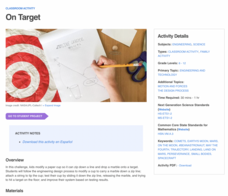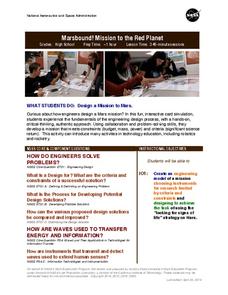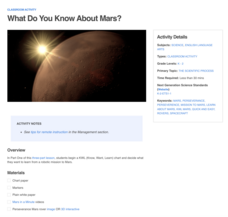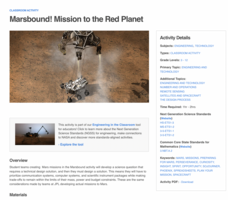Messenger Education
Look But Don’t Touch—Exploration with Remote Sensing
Mars is home to the tallest mountain in our solar system, Olympus Mons. In this set of two activities, learners review geologic land formations through the analysis of aerial maps. They then apply this knowledge to aerial maps of objects...
IMAX
Hubble
Explore what it takes to service the Hubble telescope. In the set of three activities, groups investigate several aspects of the Hubble telescope, including robotic arms used during repairs, spacesuits, and extravehicular activity (EVA)...
NASA
On Target
Crash into engineering by sending a marble to land on a target by way of a zip line. Using a zip line, pupils put engineering design processes into practice by modifying a cup to carry and release a marble onto a target. Scientists test,...
Messenger Education
Exploring Exploring
The reason people first began trading was because of their desires for objects other societies possessed. In the activity, classes discuss why exploration has been a common thread in all societies and where these desires have taken...
NASA
Collecting Light: Inverse Square Law Demo
Light, distance, and mathematics come together to help scientists plan for space missions. Groups examine the relationship between distance from the sun and light availability in a hands-on exploration activity. They model the inverse...
Teach Engineering
The Amazing Red Planet
Introduce your class to Mars with a resource that provides information about its size, location, length of day, length of year, number of moons, and average temperature. Also includes is information about the lans for past...
University of Colorado
The Jovian System: A Scale Model
Jupiter has 67 moons! As the seventh in a series of 22, the exercise shows learners the size and scale of Jupiter and its Galilean moons through a model. They then arrange the model to show how probes orbited and gathered data.
Teach Engineering
Alloy the Way to Mars
Future engineers test different alloys to determine the specific strength of each one. Based on the results, they make a recommendation to NASA on which alloy to use on engines for spacecraft.
Super Teacher Worksheets
Our Solar System Scavenger Hunt Activity
Send students on a search for facts about the solar system with this scavenger hunt activity. Whether they are finding out how far the sun is from the earth, or the names of all four gas giants, this resource will engage young...
NASA
Engineering Design for Human Exploration
What would it take to live on the lunar surface? Small groups build model rockets in order to simulate launching a habitat into space and rebuilding it. Divide the class into groups to design and build a model of a lunar habitat. The...
NASA
Marsbound! Mission to the Red Planet
It's time to go to Mars. Using the provided cards and mat, groups design a mission to Mars. The cards contain information about the different components of the launch and warn about a few mishaps that might occur along the way.
PBS
The Planets of the Solar System
Launch a lesson that's sure to capture middle schoolers' interest! Exploration enthusiasts examine the planets of our solar system using an activity from PBS's Space series. The resource includes images and information for each planet,...
NASA
What Do You Know About Mars?
Learn exciting facts about Earth's neighboring planet—Mars! Young scientists collaborate on a KWL chart about Mars, adding information as the activity progresses. Scholars listen while teachers read an article about Mars and watch...
NASA
What Tools Would You Take to Mars?
Having the right tool for the job is a must. Young space explorers design their own missions to Mars by deciding what they would like to learn about the planet. At the end, they draw and write about the tools they need to accomplish...
Teach Engineering
Are We Alone?
Find an answer to the age-old debate of whether life exists on Mars. Groups determine criteria to help look for signs of life on Mars. The activity has the class simulate testing Martian soil samples for signs of life before drawing...
Teach Engineering
Strong-Arm Tactics
Experience collecting rock samples using a robotic arm with an activity that has pairs work together to operate a robotic arm. One pupil serves as the eyes and the other operates the controller. The objective is to be the fastest pair to...
NASA
NASA: Moving Cargo
How does NASA transport people and cargo to planets? The five-lesson unit breaks down the transportation system that scientists use to transport cargo to space. Pairs team up in order to devise a transportation system that will...
National Woman's History Museum
Breaking Through Gender Roles: The Women of NASA
Whether recognized or not, extraordinary women were integral to breaking gender barriers and putting Americans into space. For Women's History Month, explore a series of video clips and biographical information that profile these...
NASA
Exploring the Colors of Mars
Minerals on Mars are not that different than those on Earth. Using mineralogy concepts and satellite images, individuals use color to highlight the different surface minerals on Mars when creating a model of the planet. They enhance...
NASA
Marsbound! Mission to the Red Planet
Changing one aspect of a mission impacts all the others. Learners consider a list of criteria as they develop their own science questions related to Mars and design a solution while considering all the important systems: computer,...
NASA
Feel the Heat
Heat water up like a NASA engineer. Using the engineering design process, investigators create a system to trap and move heat through a water-filled tube. Designers participate in a post-activity discussion that highlights the role of...
NASA
Build a Satellite
Shake, rattle, and explore space with satellites. Engineers learn how satellites work before designing, building, and testing their own models. Groups engage in quality assurance reviews with colleagues to improve their designs, and the...
NASA
Exploring Exoplanets with Kepler
Calculate the movement and properties of planets like professional astronomers! Scholars use Kepler's third law to find Mercury and Venus's distance from the sun. Using changes in brightness of distant stars and Kepler's third law,...
Teach Engineering
Edible Rovers
The good thing about building this rover is you get to eat it afterwards. Pairs determine rover parts they want to include in their design based upon their cost and usefulness. The teams design their rovers, build them from edible...























